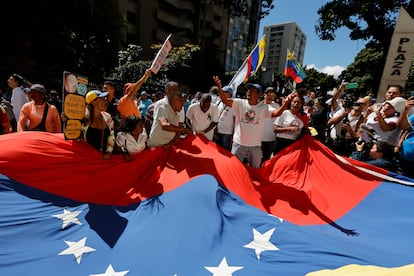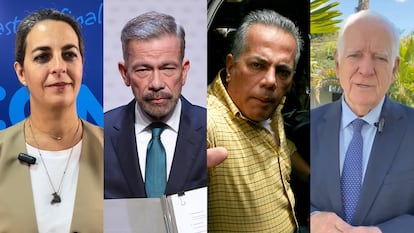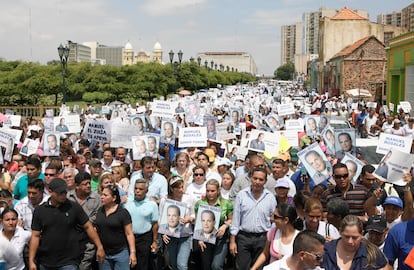From Manuel Rosales to Eduardo Fernández, how the search for an alternative candidate to María Corina Machado is playing out in Venezuela
The opposition has been unanimously in favor of the winner of the presidential primaries, but faced with her disqualification, some sectors are betting on a plan B

Factions from the Venezuelan opposition are on a search against the clock for a path that will allow them to present a united front in the presidential elections on July 28. Varying interests have not always aligned, and strategic visions have clashed on occasion, but the coalition of the parties critical of Nicolás Maduro has found itself in a crucial moment, and have very little time to decide on a plan. The period for the registration of new candidates ends on March 25 and María Corina Machado, the candidate with the best likelihood of success but who has been disqualified by the Chavista administration, has asked her followers for “trust” in a message that was shared on her social media. The political veteran was confident that she would make “the correct decisions” when it came to leading anti-Chavista factions to an electoral victory.
In her message, Machado opened the door to alternative solutions for ensuring continuity to the electoral campaign she has led, in case the institutional veto against her cannot be modified. In spite of nearly unanimous support for Machado among opposition factions, some activists, academics and small political parties continue to propose alternative candidates to replace her.

Manuel Rosales, governor of the state of Zulia and leader of the political party Un Nuevo Tiempo (UNT; in English, A New Era), has been publicly proposed by opposition leader Luis Emilio Rondón, one of his close supporters, as a possible candidate. Un Nuevo Tiempo, which came out of the moderate social democracy of the Plataforma Unitaria (PU; in English, Unitary Platform) alliance, is one of the few opposition political organizations that has maintained its card to participate in the National Electoral Council. Rosales did not register as a candidate in the primary elections that took place on October 22.
Insisting on consensus among the parties, other sectors have proposed the candidacy of Eduardo Fernández, a veteran Social Christian leader, 1988 presidential candidate and important leader of the pro-democracy movement, who in recent years has cultivated a moderate, solomonic political stance. “Those who wish to capitalize on national unrest cannot be arrogant people, possessed by revanchism,” says Víctor Alvarez, economist, former Chavista leader and current activist for change. He’s betting on Fernández.
“A good candidate has to support the reconciliation of a country, an end to conflict, have clear ideas when it comes to national problems, with ethical and moral command of the armed forces in a transition process. Venezuela needs a proposal for national union,” says Mercedes Malavé, Social Christian opposition activist and general secretary of Unión y Progreso (Union and Progress, in English), the party that was founded by Fernández eight years ago.

“In order to achieve institutional recovery, it is necessary to present a series of viable and realistic agreements with the factions in power, based on the needs of the country, starting with the premise that the economic model of the ruling party has completely failed,” says Malavé. “I have worked with Eduardo Fernández on the need to come up with a consensus candidacy in this political moment,” she continues. Malavé opposes Machado’s intransigent attitude. “From a partisan point of view, that looks bad. Our proposal for a consensus candidate includes other sectors from around the country, a simple agreement on a proposal for governance, a complete interpretation of the national constitution, to definitively overcome the nation’s rentier model.”
A few weeks ago, Fernández traveled to Maracaibo — the country’s second most important city, capital of the state of Zulia — to speak with Rosales and strengthen, as much as possible, an alliance between opposition parties. “I came to meet with Governor Rosales to talk with him and ask him to use all of his influence to prevent the forces of change from being divided,” he told the press.
Although he has received the backing of certain individuals and small parties, Fernández — who is, ultimately, a well-known personality — still has modest projection in the polls and little political support. Among members of Machado’s campaign committee, the leading group among opposition forces, silence reigns when it comes to names for alternative candidates, though many feel that Gerardo Blyde, a highly experienced negotiator, could well be on the list.
In any case, Machado has committed to internal agreement on the matter, largely due to the fact that the opposition only has two electoral cards available to it — those of UNT and the UP — after the National Electoral Council invalidated 16 opposition political parties over the last few days.
Among members of Machado’s team, her replacement is a prospect that has been summarily dismissed from the very beginning. Some isolated voices have whispered about the possibility of a candidacy led by Magalli Meda, Machado’s close collaborator on many political and logistic matters, and with whom the candidate occasionally appears. A member of Vente Venezuela, a party in which she wields enormous influence, Meda is nonetheless little-known on the national stage. Though her name has appeared in speculation about possible alternative candidates, Machado’s campaign has shot down the idea, largely because it is unwilling to discuss the idea of anyone else taking on the candidacy. But what is a subject of conversation is how to approach maintaining “consensus”, a prospect that rivals among the opposition are trying to promote, and that might lead to internal confrontation among pro-democracy forces.
Sign up for our weekly newsletter to get more English-language news coverage from EL PAÍS USA Edition
Tu suscripción se está usando en otro dispositivo
¿Quieres añadir otro usuario a tu suscripción?
Si continúas leyendo en este dispositivo, no se podrá leer en el otro.
FlechaTu suscripción se está usando en otro dispositivo y solo puedes acceder a EL PAÍS desde un dispositivo a la vez.
Si quieres compartir tu cuenta, cambia tu suscripción a la modalidad Premium, así podrás añadir otro usuario. Cada uno accederá con su propia cuenta de email, lo que os permitirá personalizar vuestra experiencia en EL PAÍS.
¿Tienes una suscripción de empresa? Accede aquí para contratar más cuentas.
En el caso de no saber quién está usando tu cuenta, te recomendamos cambiar tu contraseña aquí.
Si decides continuar compartiendo tu cuenta, este mensaje se mostrará en tu dispositivo y en el de la otra persona que está usando tu cuenta de forma indefinida, afectando a tu experiencia de lectura. Puedes consultar aquí los términos y condiciones de la suscripción digital.








































